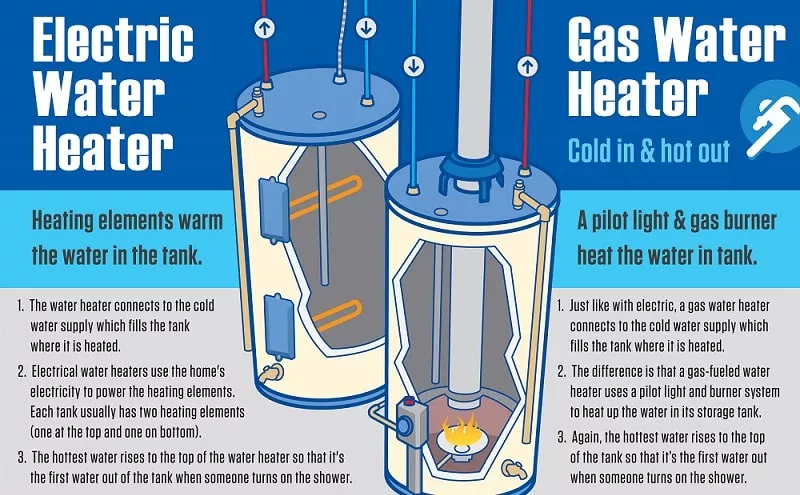In today’s modern homes, the choice between gas and electric water heaters is a crucial decision. With the necessity of hot water for daily activities like bathing, cooking, and cleaning, understanding the differences between these two types of water heaters is essential. In this regard, we will explore the basics of water heaters and how they work, and discuss the respective pros and cons of both types to help you make an informed decision for your home.
Hot water heaters are essential appliances that provide heated water for various domestic purposes. They come in different types, including gas, electric, and solar-powered models. Regardless of the type, the primary function of a water heater is to heat water and distribute it throughout the household.

Gas hot water heaters utilize natural gas or propane to heat water. They consist of a tank where water is stored and a gas burner or heating element at the bottom. When the thermostat detects a drop in water temperature, the burner ignites, heating the water inside the tank. As the water heats up, it rises to the top of the tank, ready for use.
Gas hot water heaters function by burning natural gas or propane to heat water. Whenever the thermostat detects a drop in water temperature, it signals the gas valve to open and ignite the burner. The burner then heats the water inside the tank till it reaches the desired temperature set on the thermostat. Once heated, the water can be used throughout the home as a gas hot water service.
Gas water heaters offer potentially lower operating costs in specific regions and faster heating, catering to larger households.
Pros:
Cons:
Electric hot water heaters rely on electrical resistance coils to heat water. Similar to gas heaters, they feature a tank for water storage. Inside the tank, electric heating elements heat the water when the thermostat signals the need for heating. As the coils heat up, the water around them also heats up and moves to the top of the tank, ready to be used.
Electric hot water heaters operate by heating cold water using an electric element, ensuring a steady supply of hot water for household use. Transitioning to a tankless system can offer benefits such as energy efficiency and continuous hot water availability based on demand.
Electric water heaters prioritize safety and affordability, especially in homes without existing gas lines or with safety concerns.
Pros:
Cons:
In conclusion, selecting the ideal water heater for your home depends on factors such as your specific requirements, budget, and preferences. Gas heaters offered by Craigs Gas & Plumbing provide faster heating and lower operational costs but require a higher initial investment and maintenance. Conversely, electric heaters provide a more economical upfront cost and easier installation, yet may lead to increased long-term energy bills. It’s essential to also consider elements like energy efficiency, available space, and environmental impact in your decision-making process. By carefully evaluating the advantages and drawbacks, you can determine the water heater that perfectly aligns with your household needs.
By grasping the fundamentals of water heaters and comparing the attributes of gas and electric models, you can confidently opt for the most suitable option for your hot water requirements. Whether you prioritize efficiency, cost-effectiveness, or environmental consciousness, there’s a tailored water heater solution available to meet your needs. Don’t forget to consider Craigs Gas for any future gas heater repairs or hot water installations, ensuring a reliable and efficient hot water system for your home.
